Counties and Metros
Checklist and Schedules
Sample Resolutions
Budget Report
Reappraisal Budget Guidance
The most important action a governing body takes each year is the adoption of the annual budget. Through the budget, elected officials establish spending authority and set the priorities of the local government. One community’s priority could be the reduction of crime, while another’s maybe investing in better parks and sidewalks. Whatever the plan, if the budget is not monitored to ensure that public dollars are spent as intended, problems can occur.
Budget To Actual Monitoring
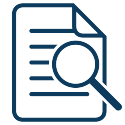
After the governing body approves the budget, the members will need updates on how the plan is going. Reviewing budget to actual reports frequently throughout the year is the most effective way for the governing body to maintain a well-managed budget. Budget to actual comparisons show how close the budget estimates are, if changes to the budget are needed, or if everything is on course as planned. Accuracy in accounting data is essential to make useful budget to actual reports, and timeliness in reviewing the information is vital.
Revenues

Revenues are meticulously forecast during the budget preparation phase, but as the budget year progresses, revenue collection should be closely monitored for variations from original estimates. Most tax collections are cyclical. Comparing the current year’s monthly collections to last year for each tax category will help a local government understand if its assumptions, such as whether its planned growth rate is holding true. Timeliness is important because if revenue collections are lower for the year, then cutting expenditures or increasing the use of fund balance may be needed to ensure the budget remains balanced.
Operating Budget

Operating expenditures tend to be less cyclical than revenues – think salaries and benefits. However, even with less variability, the level of spending should be monitored throughout the year. A local government should closely review items like overtime; fuel and commodity purchases; repair and maintenance; and any item that can quickly increase due to outside forces. If changes to the operating budget are planned for mid-year, then those changes should be forecast throughout the remainder of the fiscal year.
Capital Expenditures
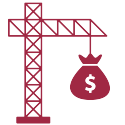
Most capital expenditures tend to be planned well in advance, but cost overruns on large capital items, as well as small replacement items, can add up to an unbalanced budget. Local governments should frequently review any ongoing capital projects and ask department heads for updates on their plans to replace items so adjustments can be made if needed. It is important to know in advance what the funding source is for capital project cost overruns.
Amending The Budget

Every item in this document has led to this: It is very important to amend the budget throughout the year. When amending the budget, local governments should keep these principles in mind: the budget must be amended prior to increased spending; recurring revenues should be used to pay for recurring expenditures; cash liquidity must be considered; debt must be paid; and adequate reserves should be maintained. Amending the budget takes time, so local governments should know the process and how much lead time it takes to finalize an amendment. The budget undergirds the vision and strategy for a local government, and care must be taken to constantly monitor it.
In our publication “Steps to a Well-Managed Budget” we discuss the importance of monitoring and amending the budget as needed. As a follow-up, see the below questions we have received on this topic with best practice responses to those questions.
Click a question to expand the answer. For a pdf publication of all questions and answers, please click the red button following all the questions.
Our office recommends individual board members receive a monthly budget to actual report with updated financial information as of the most recent month for each budgeted fund.
The report shows you year-to-date actual revenue and expenditures/expenses compared to the original budget you passed and the impact to fund balance (or net position).
Ask yourself:
• Are our original estimates holding? If not, you should understand why and see what action, if any, is needed.
• Are revenues coming in short? If yes, determine if spending should be cut or if you have sufficient cash reserves to make up the shortfall, which will decrease fund balance. If you do not have enough reserves, you will need to cut expenditures/expenses. Remember you should always have enough cash to fund day-to-day operations. We recommend cash management and fund balance policies for your local government. Minimum levels defined by the respective policies should be maintained.
• Are expenditures/expenses consistent with budgeted amounts? Because the budget document is your legal authority to spend public dollars, it is important to amend the budget to ensure all expenditures are legally authorized prior to being incurred.
• Are utilities financially healthy or are we making decisions that will place us under the Tennessee Board of Utility Regulation (TBOUR). Keep in mind that some revenues and expenditures/expenses by their nature do not occur each month and monthly variances are expected. However, you want to be sure to pay attention and ask questions when budget variances are unexpected. Your finance staff will be a valuable support.
At a minimum, and in addition to the budget to actual report, our office recommends the governing body receive:
• current cash balances for each fund
• updates from finance staff on the budget status for each fund, identifying any needed amendments to the budget
Additional recommended items include:
• updated cash flow forecasts
• multi-year historical financial data that shows the history of recurring and non-recurring revenue and expenditures/ expenses, assets, liabilities, and fund balances
• multi-year historical data and ratios to support economic trends
- The Government Finance Officers Association (GFOA) has good recommendations.
• summaries of utility budgets showing the impact of revenues and expenses on net position and net position net of grants and contributions
- When audits show two years of statutory negative changes in net position (that is, excluding grants and contributions), your local government will be referred to the oversight of the Tennessee Board of Utility Regulation (TBOUR).
• long-term capital improvement plan/budget
• internally designed reports
- Your finance staff can help design reports. If you are new to the board, be careful not to ask for too much, too soon. Give yourself time to understand the information already being provided to board members. MTAS and CTAS can also help you design meaningful reports.
The budget should be amended to ensure it remains balanced throughout the fiscal year. The three main occasions being: (1) additional spending authority is needed, (2) additional revenue is received (grant/gift) and needs to be expended, and (3) revenue shortfalls require reduced spending authority.
Within 30 days of the budget being submitted to the Comptroller’s Division of Local Government Finance, your local government will receive a letter via email explaining the results of our review: approved without comment, approved with some consideration, approval conditioned on some action, or not approved. This letter should be sent to all board members and discussed in the next regularly scheduled meeting. The letter will also be available online.
Citizens and customers rightly expect the governing body to abide by the budget that was adopted and to make amendments when needed. At a minimum, they should hear you discuss the status of the budget at monthly board meetings. A great next step is to make available on your website a monthly budget to actual report showing, by fund, revenues collected by major category; expenditures/expenses by department; net change in fund balance/net position; and cash amounts. Remember, you are stewards of public dollars where transparency and accountability are foundational to that stewardship.
In collaboration with finance staff, the governingbody should:
• Take needed action on areas from the Comptroller’sannual budget review letter.
• Implement items from your most recent audit. Reviewauditor findings and recommendations, best practices,and management letter items, as applicable. Form a planto address all of them, not just the budget related ones.
• Use financial information from last year’s audit to helpestimate this year’s budget amounts.
• Forecast revenue and expenditures for the budget year(our website has revenue-estimating tools).
• Review the following for needed updates:
- Budget calendar
- Budget controls
- Fund balance and cash management policies
- Capital improvement plan; considerneeded financing
• Reach out to your MTAS and CTAS consultantsand advisors.
Take advantage of our online resources: such as the budget manual, annual budget memo, sample budget ordinance and resolution, budget schedules with estimator tools, example submission documents, certification template, helpful videos, sample utility budget template. Also be sure to see how your local government can qualify for the Comptroller’s annual budget certificate. If you have questions about our resources, reach out to your financial analyst.
Better Utility Budgeting and Financial Planning
Financial oversight of public utilities is essential to ensuring citizens have access to affordable water, sewer, gas, and other utility services. This oversight must be intentional and planned. The following sections outline several basic best practices in utility budgeting and financial planning.
Review the Audit

Analyze the previous year’s audited financial statements to understand revenue sources and types of expenses. Identify significant changes since the audit (capital additions, issuance of debt, new customers, etc.). Take note of any audit findings or recommendations and ensure they are addressed.
Current Year Operations

Evaluate the current year’s operations and consider factors such as changes in customer demand, service levels, and operational efficiency. Identify any unforeseen challenges or opportunities that may impact the budget. Understand the key drivers of costs in the current year, such as personnel expenses, maintenance, and ongoing capital projects. Evaluate whether any cost-saving measures or efficiency improvements can be made.
Revenue, Expense, and Cashflow Projections

Consider revenue and expense trends from previous years and project future operations based on factors like customer growth, rate adjustments, and changes in service demand. Forecast cash flows to ensure your utility maintains adequate cash to pay for bills as they become due without the need for operating loans.
Capital Planning

Based on the audit and operational assessment, note any critical infrastructure needs or capital projects for the current year. Incorporate these into the budget and consider funding options. Develop a long-term capital improvement plan that aligns with the utility’s strategic goals and will address infrastructure challenges over time. Understanding the current state of assets, planning for their replacement or improvement, and identifying appropriate funding sources, all contribute to the long-term sustainability and reliability of utility services. By integrating the insights from the previous year’s audit and the current year’s operational data, the utility can develop a more accurate and informed budget that reflects the financial reality and goals of the utility. Regular monitoring and adjustments throughout the year are also necessary to respond to changing conditions and ensure financial stability.
Rate Setting
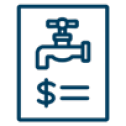
Rates and charges set by the governing body should be sufficient for all reasonable expenses of operation, including interest and other nonoperating expenses. Rates should also generate enough cash to pay both principal and interest requirements on debt. Rates are expected to be adjusted to cover these costs and should always be reasonable and justifiable. Each utility should have rates sufficient to have a positive change in net position separate from grant proceeds and contributions. Utilities that do not achieve a positive change for two years will be referred to the oversight of the Tennessee Board of Utility Regulation (TBOUR). A policy for periodic rate studies is a proactive and strategic approach to managing the financial health of a utility. Conducting thorough internal reviews during non-rate study years allows utilities to proactively address challenges, optimize operations, and lay the groundwork for informed decision-making in subsequent rate studies. Some utility systems have an annual cost-of-living rate increase that is adopted once, and then rates adjust at an inflationary percentage each year.
Depreciation

Depreciation is often one of the largest operating expenses of a utility system. Depreciation is the allocation of the cost of a capital asset (such as equipment and facilities) over its estimated useful life. It helps to accurately reflect the wear and tear on these assets over time and allocate associated costs to the periods in which the asset provides service. Depreciation is crucial in financial reporting, rate-setting, asset management, and decision-making for utilities.
Budget Format
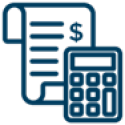
State law requires the budget to be adopted on a basis consistent with generally accepted accounting principles (GAAP). A GAAP format that reconciles to statutory and cash bases helps ensure your rate structure is sufficient to support operations, comply with state law, and have needed cash flow. Columns for the prior audit year, estimated current year, and upcoming budget year, with clearly defined sections assist management and the governing body as they prepare, adopt, and monitor the budget.
Policies

Sound financial policies lay the foundation for good financial decisions. At a minimum, you should have policies for internal controls, budget adoption, cash flow management, billing, rate increases/adjustments, asset management, and debt management.
Monitoring
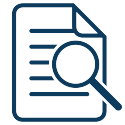
Once you have the annual budget adopted and long-term financial plans in place, they should be reviewed and updated as needed to make sure your utility system remains on track.